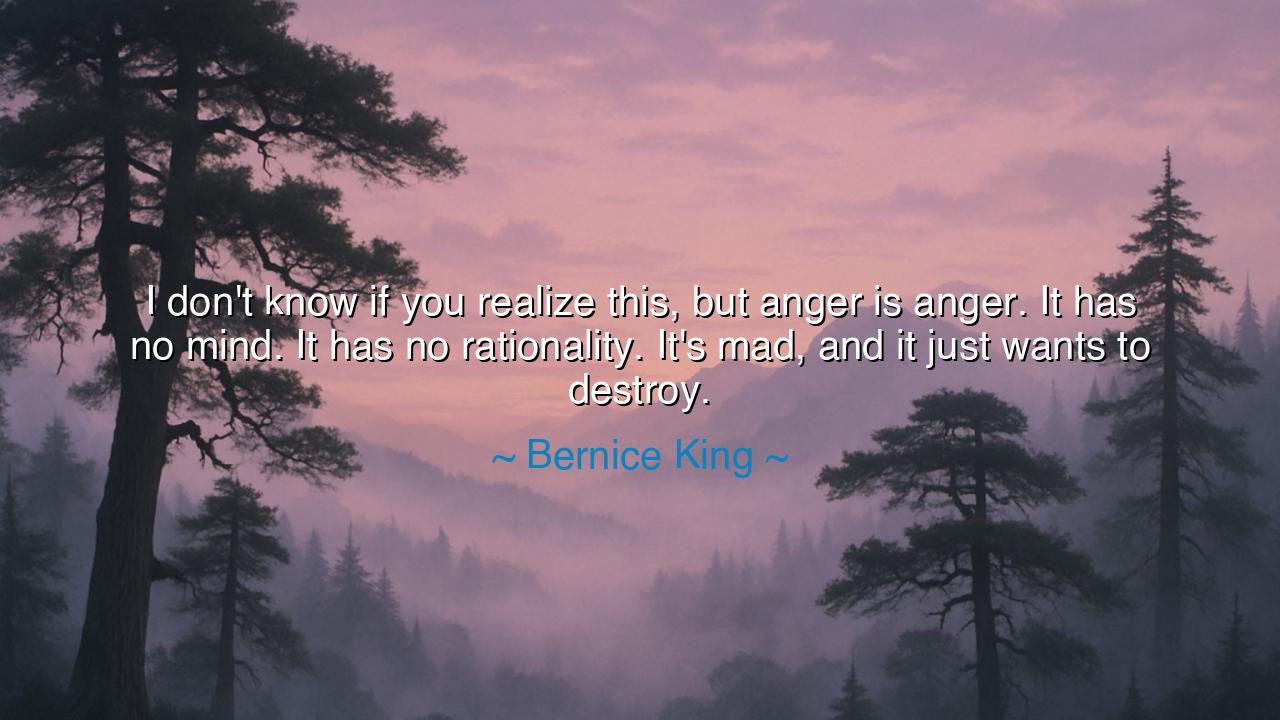
I don't know if you realize this, but anger is anger. It has no
I don't know if you realize this, but anger is anger. It has no mind. It has no rationality. It's mad, and it just wants to destroy.






Opening Scene – Narrated by Host
The room was quiet, with soft light streaming through the window. Jack sat at his desk, reading a passage that seemed to resonate deeply with the emotions he had been reflecting on lately. The quote from Bernice King stood out, cutting through the noise of everyday thoughts. It spoke to the raw, unfiltered nature of anger, its destructive power, and how it exists beyond reason and logic.
Jeeny entered the room, noticing Jack’s intense focus. She sat down across from him, sensing he was lost in thought.
Jeeny: “You seem deep in thought. What’s on your mind?”
Jack looked up and smiled faintly, holding the quote in his hand.
Jack: “I was thinking about something Bernice King said: ‘I don’t know if you realize this, but anger is anger. It has no mind. It has no rationality. It’s mad, and it just wants to destroy.’ It made me reflect on how anger operates, how it’s not always something we can control. It doesn’t need a reason—it just is. And when we’re consumed by it, it can take over everything.”
Jeeny nodded, her expression thoughtful as she absorbed the meaning of King’s words.
Jeeny: “That’s a powerful perspective. Anger doesn’t have logic or reason; it’s an emotion that can be all-consuming, making us feel like we’re losing control. It’s interesting how King says anger wants to destroy—it’s almost like an external force that takes over and drives us to act without thinking. We’ve all had moments where anger makes us say or do things that we later regret, right?”
Jack: “Exactly. Anger can feel so overwhelming because it’s not a thought process—it’s pure emotion. And when we’re in the grip of it, we often don’t see things clearly. It doesn’t matter if there’s logic behind it; anger just wants to be expressed, often in destructive ways, and that’s what makes it so dangerous. It’s not about right or wrong—it’s just this force that compels us to act.”
Host: Their conversation deepened as Jack and Jeeny explored the nature of anger, the lack of rationality in its essence, and the way it can control us if we’re not careful. King’s words weren’t just about understanding anger—it was about recognizing its power and how it can lead us down a path of destruction if we allow ourselves to be consumed by it.
Jeeny: “It’s almost as if anger doesn’t care about consequences. It’s not something that checks in with reason or asks whether it’s the right time to act. It just pushes us to do something, anything, to express itself. And the more we give into it, the more it controls us.”
Jack: “Right. And it’s easy to let that happen, especially when we feel wronged or frustrated. But King’s point is that we have to recognize that anger is not rational. It doesn’t come with clear answers—it’s a feeling that doesn’t have direction unless we give it one. So, the real challenge is learning to manage it, to step back and prevent it from controlling us.”
Jeeny: “It’s like anger is a warning sign, but if we don’t pay attention to it, it can spiral out of control. It’s not about suppressing it, but understanding it, recognizing it for what it is, and choosing how to react. That’s the difference between letting it destroy us and using it in a way that’s constructive.”
Host: Jack smiled, feeling a shift in their conversation as they unpacked the deeper meaning behind King’s words. Anger, while a natural emotion, could be a destructive force if not managed properly. King wasn’t simply explaining anger; she was emphasizing the importance of recognizing its power, understanding its lack of reason, and learning to navigate it with awareness rather than letting it take the reins.
Jack: “So, maybe the lesson here is that anger is powerful, but it’s also our responsibility to manage it. It’s about acknowledging that it exists, recognizing it for what it is, and then making a conscious decision about how to deal with it—without letting it control us.”
Jeeny: “Exactly. It’s about awareness and control. Anger will come, but we don’t have to let it define us or dictate our actions. It’s a feeling, not a reason, and we can choose how we express it—without letting it lead us to destruction.”
Climax and Reconciliation
The room felt more peaceful now, as Jack and Jeeny reflected on the deeper meaning of King’s words. Outside, the world continued its steady rhythm, but inside, they had uncovered something profound: while anger could be a powerful and overwhelming emotion, it didn’t have to control us. By recognizing its nature and understanding its lack of rationality, we could take responsibility for how we responded, preventing it from leading us down a destructive path.
Jack: “So, the key is not letting anger define us, but learning to navigate it in a way that’s healthy and constructive. It’s about control and choice.”
Jeeny: “Exactly. Anger is part of being human, but it doesn’t have to take over. We have the power to manage it and use it wisely.”
Host: The conversation settled into a quiet understanding. Anger may come without warning and without reason, but how we choose to deal with it is what truly matters. By recognizing its power, understanding its nature, and making conscious choices, we can prevent anger from controlling us and, instead, use it as an opportunity for growth and awareness.






AAdministratorAdministrator
Welcome, honored guests. Please leave a comment, we will respond soon